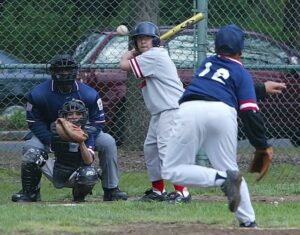Being a former competitive athlete, I am grateful my parents had a healthy balance of knowing when to push me to be my best and when to turn the reins over to me and allow my own intrinsic motivation to be the fuel that drove my desire and passion.
I can remember our conversations in the car ride home being brief and positive. Most of them simply involved me being asked how practice went and if I was still enjoying gymnastics. Our conversations after a competition weren’t much different. Those usually involved me being asked what I wanted to eat. By that time, everyone in the family was exhausted from four hours of sitting in the bleachers. The last thing anyone wanted to do was listen to a play-by-play of what they had just watched.
If I had not done particularly well and I was upset, my father would help me by asking me if I had done my best. If I answered yes, then he would respond my best is all I could do. He then went on to explain to me that in life there would always be someone better than me. My job in practice was to prepare to be the best I could be and then go out and do my best every time with the understanding that sometimes my best would not be good enough. However, that did not mean I was a failure or that I should stop trying my best.
Unfortunately, conversations like the ones I had with my father are few and far between in today’s youth sports. As a coach of 30 years I have seen athletes leave sports sooner than they would have because of the car ride home.
So what is it about the car ride home that drives so many athletes from the game they love?
Well-meaning parents are failing to recognize the time after a game (or practice) is critical for their child.
Kids are physically and emotionally exhausted; yet parents choose to make the car ride home a “teachable moment” by commenting on the coach’s decisions or their child’s performance (or lack thereof).
Questions To Ask Your Child To Improve The Ride Home
Here are some questions parents can ask that will encourage healthy dialogue between them and their child after a game (or practice) that will allow the child to feel he/she is still in control of their sport.
- Did you do your best? This question encourages work ethic and integrity
- Were you a good person out there? This question reminds the child of sportsmanship and helps him/her to reflect on his/her behavior
- What did you learn? This question also causes self reflection and encourages further dialogue
- Did you have fun or was it enjoyable? Depending on the level of the child, the wording may change. When thinking of “fun”, it’s not the type of fun one would experience while at a fair or amusement park, but rather the enjoyment one receives from accomplishing a goal or helping others to achieve one common goal.
The key when asking the above questions or having the after game (or practice) conversation, it to remember this is not the time to “drill” your child.
3 Keys to Having a Successful Car Ride Home
There are three keys to having a successful car ride home.
- Let the child drive the conversation. Even in asking the questions, let the child lead.
- Don’t force the conversation. Remember they just finished a game or practice and they are physically and emotionally exhausted.
- Always let them know you love them and are proud of them no matter the outcome of the game or practice.
The car ride home does not have to be stressful for the child or parent. Let’s all work together to create different conversations after the game so our children can leave on their own terms.
With our 100% money-back guarantee and vetted coaches, anyone can achieve their full athletic potential. CoachUp is the safest and easiest way to find a coach for personalized training. Find your perfect coach today and become the athlete you want to be!
How useful was this post?
Click on a star to rate it!
Average rating 4.9 / 5. Vote count: 72
No votes so far! Be the first to rate this post.




10 Responses
My daughter was on a competitive soccer team and some the issues I saw involved the head coach and the blatant negativity when games were lost. The negative attitude crept into the players and parents to the point where a game that was once fun became not fun. This was not because of the game but because of the environment. My daughter did leave the team and went back the re recreation league. Where playing hard and having fun are the goals not just to have a “W” in the column.
Brett,
I’m sorry to hear she lost her love for the competitive side of soccer due to her negative experience. I’m glad she had a safe place to return where she could still enjoy the game. I am still hopeful that after five years from when I initially wrote this article, the winning at all cost type of coaching mindset is becoming more of the minority rather than the majority. Thank you for sharing your story.
Coach Christina (Author of Article)
Certified Mindset and Confidence Coach
http://www.christinacc.com
Our car rides home involve singing at the top of our voices and dancing. It’s fun time.
I agree but we have to also prepare children athletes for reality and high standards and telling them only what they want to hear or encouraging them to be average is also not good. The ultimate goal can not be make them “feel” good, no matter how they perform”.
There has to be a healthy balance. The culture of the day is full of excuses, underachieving, and lowering the standards of excellence and greatness. The standard of striving for perfection should not be lowered.
Absolutely no one in this world is perfect. Striving for perfection only causes increased stress and anxiety. Some children are not natural athletes and will never be the star of their team. Physical activity is important part of everyone’s life and should be encouraged no matter how a child performs. The rate of adult and children obesity and related health conditions are overwhelming. Children need to learn to enjoy sports / physical activity regardless of the outcome for their own mental and physical well-being. There is a healthy balance and parents should at times push their children when they know they’re being lazy or could do better. Perfectionism = stress, anxiety, depression. Who would want that for their child?
This is an interesting conversation. My son and I have had similar conversations after games in which he was feeling rejected by his coach, having lost the game, etc. While I validate his feelings, I can’t help but point out to him, afterwards, that his perception of what happened on the pitch were inaccurate as I witnessed all that he had issues with did not happen as he said. I felt and still do feel that it was and is necessary to instill in him a good sportsmanship. The bottom line is always the question if he still wants to play. If he says “no” fine, then we’d quit. If “yes” then it’s not about what he wants but what the ref says (even if it is objectively wrong) or that the coach is trying to teach him something. He used to bemoan playing second string, but then the coach tells me he is not listening which is why he is played second string. I tell my son to play attention to his coach. He does and now he is one of the most important part of the team. He once freaked out on the pitch when another teammate received a red card that was questionable. The ref warned him to calm down or else he’d be issued a red card, I had to almost yell at my son to shut up and calm down so he wouldn’t jeopardize the team more. Youth sports should be a place to play for fun, learn how to get better as an athlete, and also to teach kids life lessons on how to be a more mature person.
Every parent should watch this Ted Talk
https://youtu.be/VXw0XGOVQvw?feature=shared
It’s on this exact topic.
This was amazing please more later
This is helpful, but unfortunately a lot of coaching staffs NEVER put the kids in a position to win. In fact, most youth coaching staffs do not teach their kids to win. Some coaching staffs stack their team with talent such as, the head coach, assistant coach, and sponsor, might have 4 or 5 studs so they team up to play together. This is experienced all over the country , but especially in Yuma. It seems most people who coach children, do it so their kids can make all stars. Just my two cents worth.
Spot on, well said. I think parents believe they are helping, but we need to remember that coaching is not our job. I try to remember that sports are just a small part of my relationship with my children and now grandchildren. Thank you for your great word!